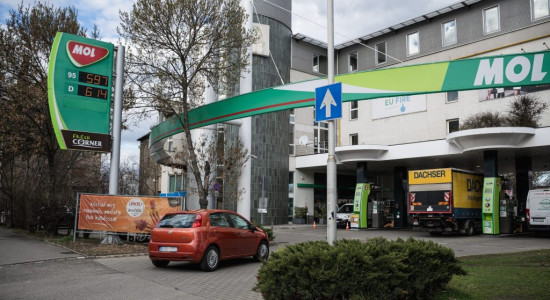Albeit with huge fluctuations, the price of oil is rising drastically following Israel’s airstrike against Iran early Friday morning. It has been years since such a single-day price hike in the stock market price of crude oil – the last time we saw something similar to what happened Friday morning was at the outbreak of the Russo-Ukrainian war in 2022. Market participants are worried about the supply of oil and gas from the Middle East. As is customary in times of crisis, investors are fleeing to government bonds and gold. This Friday was no exception: the price of the precious metal rose by one percent.
Experts interviewed by 24.hu see serious uncertainties in the markets. According to Dávid Németh, chief analyst at K&H Bank, this is because it is not yet clear how the conflict will unfold, what further attacks and retaliations will take place. Israel is promising further action, and on Friday Iran already sent drones to strike back against the Jewish state. The price of oil is on the rise, although there has been a correction; it is moving erratically and by Friday noon it once again crossed the 74-dollar threshold — Németh explained.
A similar trend is observable with the forint: early in the morning, the Hungarian currency suddenly weakened to 403 forints per euro, but by 11 a.m. Friday it slightly recovered, fluctuating between 401 and 402 forints. Of course, this still represents a weakening compared to the 400 forints per euro exchange rate it held late Thursday night, on the eve of the Israeli attack.
Given that the market is very volatile (i.e., fluctuating and erratic), all that can be said for now is that the current conflict does not benefit the Hungarian economy. According to Németh, fuel prices will rise in the short term, which is bad news for inflation, but if the price of oil remains high for a prolonged period, the transport sector will also feel the impact and freight companies will be forced to raise prices.
Israel did not attack Iran’s oil production infrastructure — the strikes focused on other strategic targets, as well as military leaders and scientists — so a long-term rise is unlikely.
An increase from 65 to 70 dollars is unlikely to seriously destabilise the Hungarian economy
– explained K&H’s macroanalyst.
The question remains, of course, whether trade sanctions are to be expected, and how much the current conflict will disrupt the global economy.
So far, the impact of the Israeli attack on European stock and government bond markets has been limited. As is typical in times of conflict, everyone is seeking secure investments and trying to avoid risk, therefore — temporarily, on Friday morning —developed market (Western Europe, America, Japan) government securities experienced a surge in demand, resulting in decreasing yields. By midday, however, European yields were slightly in the green, indicating a market correction in Németh’s view.
Meanwhile, equity markers saw declining demand, so Western European stock markets opened Friday morning in slight negative territory, but this has not yet significantly rattled European markets. Germany’s DAX was down by about 1.35 percent at 10 a.m. on Friday. According to Németh, it is also a question of how long the US will tolerate the conflict, and how much it will allow the airstrikes to continue. Beijing has so far responded cautiously, with China drawing attention to the “risks of escalation”. The macroanalyst says it is possible the same will unfold as when the conflict in Gaza erupted: markets will calm down after the initial panic, and while volatile and fluctuating exchange rates are to be expected, extreme market disruptions are unlikely.
Tamás Pletser, energy market analyst at Erste Bank, told 24.hu that the initial reaction to the attack on Iran was a seven percent jump in the global price of oil. The price continued to rise for a while, from the 65-dollar level to around 75 dollars (which, according to CNN, was exactly a 13 percent increase). Later that day, the price corrected, as Pletser put it, and fell back to the 73-dollar level. However, by midday Friday, it once again climbed above 74 dollars.
The analyst does not expect a sustained price above 70 dollars, because fundamentally, there is a global oversupply of oil. However, as long as the Israeli-Iranian conflict remains in its armed phase, higher prices may temporarily persist, which could lead to a 10–15 forint increase in petrol and diesel prices at domestic filling stations. Petrol prices could return to current levels within a month or two. According to the Erste analyst, the main question now is whether the conflict will escalate. In his view, an escalating conflict is not in Iran’s interests, and therefore the current mutual airstrikes will not have a long-term impact on the oil market.
At the same time, further airstrikes seem to be certain, so it of course cannot be ruled out that the conflict may continue for a while. However,
Pletser suggests that Iran may yet make an unexpected strategic move: it could close the Strait of Hormuz, where a significant portion of global oil trade passes.
This strait effectively links the Persian Gulf to the world’s oceans, and blocking this supply route could be a serious price-driving factor on the global energy markets. (One CNN expert, Andy Lipow, did not rule out a price of 100 dollars in such a scenario.) Pletser, however, does not expect Iran to take this step.
Energy market expert József Balogh told 24.hu that the Strait of Hormuz plays a hugely important role in the current conflict. Approximately 40 percent of the world’s crude oil traffic has passed through this strait over recent decades, and the transport of liquefied natural gas (LNG) has also become increasingly significant. Twenty-one percent of international LNG shipments pass through here, which will have an effect even on markets that do not directly rely on liquefied gas. In Balogh’s view, a new phenomenon in the current conflict is that Iran can now influence not only the global oil market but also the gas market, and so developments around the Strait of Hormuz are worth paying attention to in the near future. Balogh’s argument is supported by the fact that, according to Portfolio, prices on the European (Dutch) TTF gas exchange also rose sharply on Friday. However, by mid-Friday, prices also corrected there, showing a 3.5 to 4 percent overall increase.
The post Petrol prices in Hungary could rise by 10–15 forints following Israeli strike on Iran first appeared on 24.hu.
Tovább az erdeti cikkre:: 24.hu










